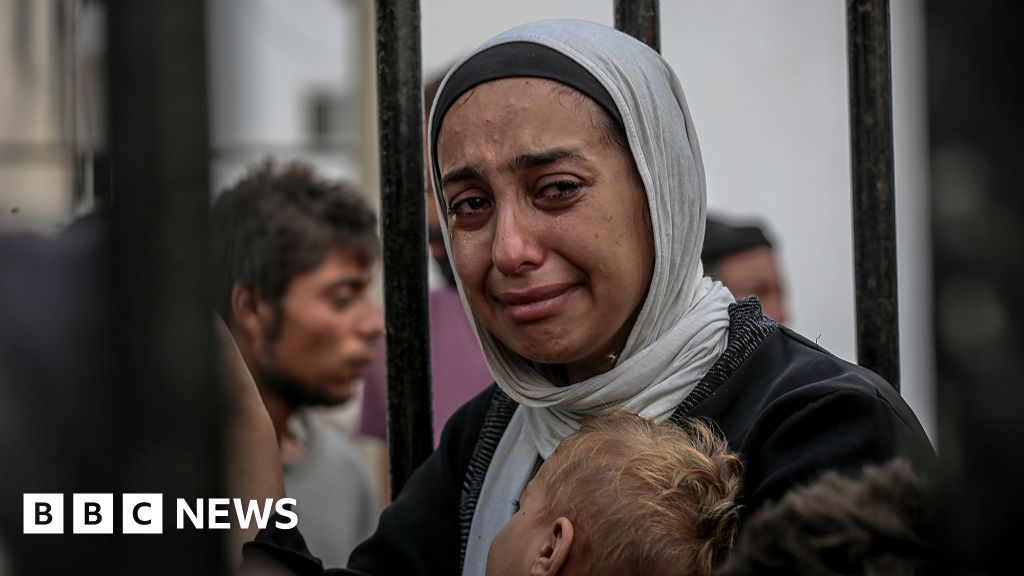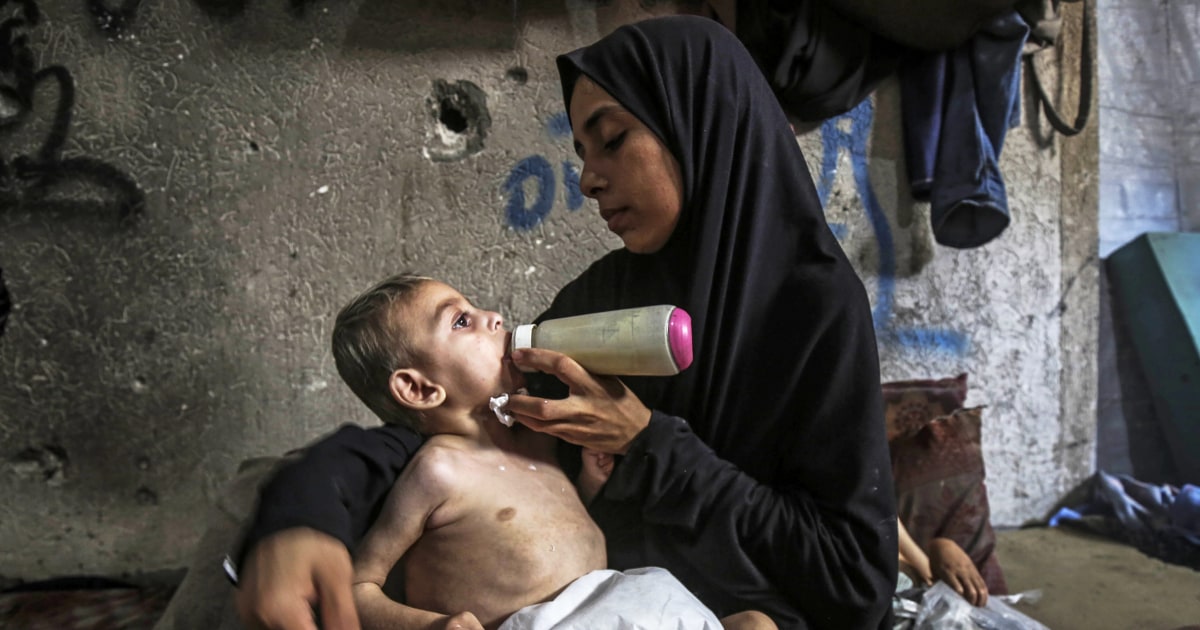The Ongoing Conflict in Gaza: A Humanitarian Crisis
#gaza #humanitarian_crisis #aid #violence #international_community

The Ongoing Conflict in Gaza: A Humanitarian Crisis
Israel has recently intensified its bombardment of Gaza City, causing widespread destruction and casualties. As the violence continues, the international community is calling for immediate action to address the worsening humanitarian crisis in the region. The United Kingdom and its allies have demanded "immediate, permanent and concrete steps" to facilitate the entry of aid to Gaza, as the situation on the ground continues to deteriorate.
Aid Blocked and Civilians Suffering
The recent escalation of violence has made it nearly impossible for humanitarian aid to reach the people of Gaza, who are facing dire shortages of food, water, and medical supplies. The Israeli blockade of Gaza, which has been ongoing for over 14 years, has severely limited the flow of goods and aid into the territory, exacerbating the already dire situation. The lack of access to basic necessities is causing an "unfolding famine" in Gaza, as civilians bear the brunt of the ongoing conflict.
The Urgent Need for Action
The international community is urging Israel to lift the blockade and allow aid to reach Gaza, as well as calling for an immediate ceasefire to protect civilian lives. The situation in Gaza is a humanitarian crisis that requires immediate attention and action from the international community. As the conflict continues to escalate, it is imperative that steps are taken to address the urgent needs of
About the Organizations Mentioned
United Kingdom
The **United Kingdom (UK)** is a sovereign island country located off the northwestern coast of mainland Europe, comprising England, Scotland, Wales (all on the island of Great Britain), and Northern Ireland on the island of Ireland. London, its capital, is a global commercial, financial, and cultural hub[2]. The UK is the world's sixth-largest economy, with a 2024 GDP growth of 0.8%, driven mainly by services, including professional, scientific, and technical activities[1]. Historically, the UK evolved from a collection of kingdoms into a unified state with a constitutional monarchy, currently led by King Charles III and Prime Minister Keir Starmer (Labour government as of 2025)[5]. Its legacy includes a vast empire and foundational contributions to law, democracy, science, and technology. Today, it remains a major center for innovation, finance, and technology, with London being a critical global financial center. Key achievements include its robust service sector growth, particularly in professional and technical industries, despite declines in traditional sectors like mining[1]. The UK has also made significant strides in scientific research, technology development, and cultural influence worldwide. However, challenges persist, including supply chain issues post-Brexit, inflation-driven cost-of-living crises, and political controversies such as immigration policies and social welfare reforms[3][6]. In 2025, the UK faces ongoing economic and social challenges, including poverty and inequality, complicated further by political dissatisfaction with recent government measures like the withdrawal of winter fuel payments for many pensioners[3][6]. Despite this, it remains a stable democracy with regular free elections and a vibrant media landscape[7]. The UK’s population is approximately 69.7 million in 2025, with diverse urban centers like Birmingham, Manchester, Edinburgh, Glasgow, and Cardiff contributing to its economic and cultural dynamism[2][9]. The government is focused on addressing socio-economic disparities while maintaining its role as a leading global economic and
Israel
Israel is a highly developed democratic country in West Asia, known for its advanced free-market economy and significant contributions to global business and technology sectors. Established in 1948, Israel has grown into a regional powerhouse with a population of approximately 9.5 million as of 2025. It is the only country with a Jewish majority population and operates under a parliamentary democracy with strong political rights and civil liberties[2][5]. Israel's economy is among the most sophisticated in the Middle East, ranked 25th globally by nominal GDP according to the IMF in 2025. It boasts the second-largest number of startups worldwide, only behind the United States, and the third-largest number of companies listed on NASDAQ after the U.S. and China. This vibrant tech ecosystem attracts major multinational corporations such as Intel, Microsoft, Apple, IBM, Google, and Facebook, all of which have established research and development centers in Israel, often marking their first overseas R&D presence there[1]. The country’s main economic drivers include high-tech industries, industrial manufacturing, and diamond cutting and polishing, with the diamond sector accounting for 21% of exports in 2017[1]. Israel’s technological innovation extends to energy, with recent discoveries of natural gas reserves and a growing solar energy industry aiming to reduce dependency on imports[1]. Despite its small size, Israel's infrastructure rivals developed nations, supported by a sophisticated welfare state and a powerful military known for advanced capabilities, including nuclear weapons[1]. Regionally, Israel faces ongoing geopolitical instability and conflict, which influence its security policies and international relations. Internal and external tensions persist, particularly regarding the Palestinian territories, impacting both domestic and foreign policy dynamics[3][4]. Public opinion within Israel reflects concerns about international respect and peace prospects[6]. Overall, Israel stands out as a dynamic hub of innovation, economic resilience, and geopolitical significance, making it a critical player in global business and technology news.
International_Community
The **International Communities Organisation (ICO)** is a London-based international non-governmental organization dedicated to empowering minority groups to secure and exercise their rights under international law, particularly the International Covenant on Civil and Political Rights (ICCPR) and the International Covenant on Economic, Social and Cultural Rights (ICESCR)[1][3]. Founded in 2016, ICO has gained special consultative status with the United Nations Economic and Social Council (ECOSOC) since 2021, reflecting its growing influence in multilateral human rights advocacy[4]. ICO's core mission is to provide marginalized communities with tools and platforms to autonomously develop their ideas and peacefully express their needs, promoting cross-cultural cooperation and respect. The organization fosters environments where minority groups can engage with states and civil society to ensure access to civil, economic, social, and cultural rights, aiming to build sustainable peace through shared visions rather than dominance of one community over another[1][3][4]. Key achievements of ICO include facilitating dialogue and reconciliation talks, offering leadership training to minority community members, and strengthening the implementation of legal rights to address root causes of conflict[4]. Notably, ICO has engaged in peacebuilding efforts in complex and conflict-prone areas such as Israel and the Occupied Palestinian Territories, demonstrating practical approaches to long-standing regional conflicts through community engagement and investment[4]. Currently, ICO operates as an independent and neutral actor, committed to protecting minority rights and advancing peaceful coexistence globally. It brings together diplomats, academics, lawyers, policy experts, and civil society representatives to create a consortium focused on justice and peacebuilding[1][4]. ICO’s emphasis on empowering communities to work for themselves and promoting sustainable governance models distinguishes it as a unique player in international human rights and peacebuilding sectors, making it a notable organization for those interested in business, technology, and social innovation related to global rights frameworks and conflict resolution.















